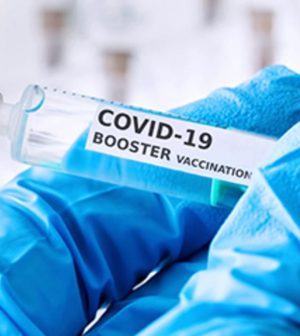- Could Your Grocery Store Meat Be Causing Recurring UTIs?
- Are You Making This Expensive Thermostat Error This Winter?
- Recognizing the Signs of Hypothyroidism
- 10 Strategies to Overcome Insomnia
- Could Artificial Sweeteners Be Aging the Brain Faster?
- Techniques for Soothing Your Nervous System
- Does the Water in Your House Smell Funny? Here’s Why
- Can a Daily Dose of Apple Cider Vinegar Actually Aid Weight Loss?
- 6 Health Beverages That Can Actually Spike Your Blood Sugar
- Treatment Options for Social Anxiety Disorder
FDA Authorizes Spring COVID Booster for Certain Americans

Seniors and people with weakened immune systems can get another booster dose of the bivalent COVID vaccine this spring, the U.S. Food and Drug Administration announced Tuesday.
Seniors age 65 and older can get a booster at least four months following their first dose of the bivalent vaccine, which protects against both the original and Omicron strains of COVID, the FDA said. People with weakened immune systems can get a booster at least two months after their last vaccine dose, based on their doctor’s judgment, the agency added.
“COVID-19 continues to be a very real risk for many people. We are therefore encouraging everyone to consider staying current with vaccination,” Dr. Peter Marks, director of the FDA’s Center for Biologics Evaluation and Research, said during a Tuesday morning media briefing.
COVID continues to be linked to about 1,300 deaths each week, according to the U.S. Centers for Disease Control and prevention.
The FDA announcement was part of an overall effort to simplify the COVID vaccine schedule for Americans, the agency said.
In its Tuesday announcement, the FDA also rescinded its emergency use authorization for the original Moderna and Pfizer mRNA vaccines, which are credited with saving tens of millions of lives during the pandemic.
Only the bivalent vaccines will be available going forward, the FDA said.
Adults and children who’ve only gotten the original vaccine remain eligible for a dose of bivalent vaccine manufactured by either Moderna or Pfizer.
Roughly 75% of Americans under the age of 65 are eligible for a bivalent vaccine dose but haven’t gotten the booster, Marks said.
“Those individuals certainly could go out and get a bivalent booster now to improve their protection,” Marks said.
People who remain unvaccinated now only need to get one dose of the bivalent vaccine, rather than the two-shot series associated with the original vaccines, the FDA said.
Unvaccinated kids ages 6 months to 5 years can receive a two-dose series of the Moderna bivalent vaccine or a three-dose series of the Pfizer bivalent vaccine, the agency said.
The FDA announcement did leave the door open for future boosters, in case a new COVID variant starts tearing through the United States.
An advisory committee in June will review the COVID strain composition expected for the fall and weigh whether another booster dose will be needed in the fall, the agency said.
“As we move into future seasons, particularly if the strain composition of the vaccine has to be updated, it may be important for all individuals to get an updated vaccine in order to provide protection against future variants that come along,” Marks noted.
The original COVID vaccines prevented nearly 20 million deaths worldwide during the first year of vaccination alone, according to an analysis published June 2022 in The Lancet Infectious Diseases journal.
That includes nearly 4.5 million lives saved in the Americas, 5.8 million lives in Europe, 5.6 million lives in Southeast Asia, 992,000 lives in the Eastern Mediterranean, 2.4 million lives in the Western Pacific and 466,000 lives in Africa, estimates stated.
More information
The U.S. Centers for Disease Control and Prevention has more about COVID-19 cases and deaths.
SOURCES: Peter Marks, MD, PhD, director, FDA’s Center for Biologics Evaluation and Research; U.S. Food and Drug Administration, news release, April 18, 2023
Source: HealthDay
Copyright © 2026 HealthDay. All rights reserved.










